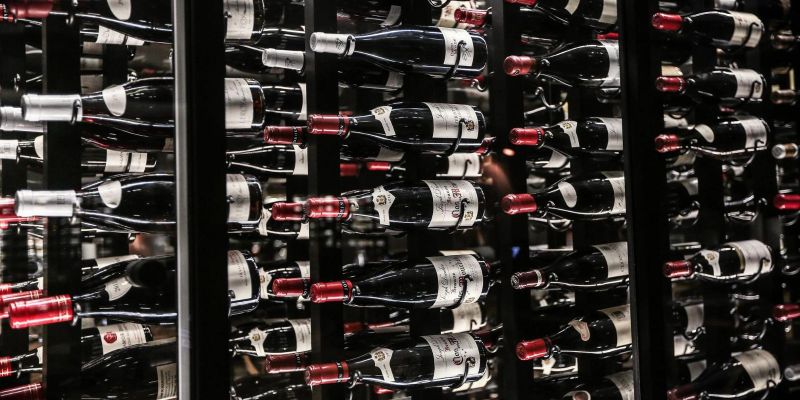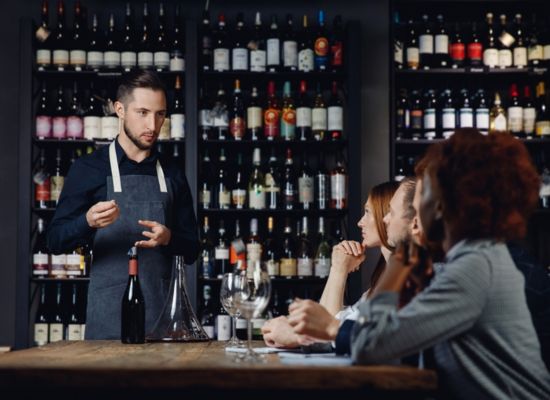Educating Sommeliers Worldwide.
By Beverage Trade Network

Selling to the on-trade sector—restaurants, bars, hotels, and other establishments that serve wine directly to consumers—poses a unique and critical challenge for a sales manager at a small, premium winery. The Institute of Masters of Wine (IMW) included a related question in their 2024 Master of Wine exam to test candidates on their understanding of market dynamics, sales strategies, and the nuances of working with on-trade clients.
The theory part of the MW exam posed this hypothetical: “As sales manager for a small, premium winery, outline your strategy to sell to the on-trade.”
This question emphasizes the importance of practical skills in wine sales and marketing, directly engaging candidates in one of the most complex and rewarding areas of the wine industry.
Let’s review how the candidates might have answered in their theory papers.
The on-trade sector allows wineries to engage directly with consumers, providing immediate feedback that is invaluable for brand development. Success in this sector can significantly enhance a winery's reputation, with high visibility in prestigious restaurants and bars elevating a brand's status. Moreover, the on-trade often represents a substantial revenue stream for premium wineries. The complexity of selling to the on-trade, which involves navigating intricate relationships and negotiations, requires a deep understanding of pricing, logistics, customer service, and brand positioning—key skills for any Master of Wine.

Source: Shutterstock
A thorough analysis of the target market is the foundation of an effective sales strategy. Begin by identifying key players in the on-trade sector that align with your winery's image and values. This involves understanding their wine lists, pricing strategies, and preferences. For example, if your winery specializes in biodynamic wines, target establishments known for their commitment to sustainability and organic offerings.
Conducting market research involves visiting potential clients, analyzing their current wine selections, and understanding their customer base. For instance, a high-end restaurant in a metropolitan area might favor exclusive, small-production wines that can be highlighted on a curated wine list, while a trendy bar might seek unique, conversation-starting wines that appeal to a younger demographic.
Positioning your brand distinctively within the market is crucial. Emphasize unique selling points such as vineyard location, winemaking techniques, awards, and sustainability practices. Create a compelling narrative that resonates with sommeliers, chefs, and beverage directors. For instance, if your winery is located in a unique terroir, highlight how the region's climate and soil contribute to the distinct flavors of your wines. Share stories about the winemaking process, such as the use of traditional methods or innovative techniques that set your wines apart.

Source: Shutterstock
Strong, personal relationships with key on-trade clients are the backbone of a successful sales strategy. Regular visits to potential and existing clients show genuine interest in their business. Attend industry events, tastings, and trade shows to network and establish connections. For example, hosting exclusive tastings and dinners for sommeliers and restaurant owners at your winery can provide them with an immersive experience, fostering a deeper connection to your brand.
Building relationships also involves understanding the unique needs and preferences of each client. Customizing your approach to meet their specific requirements can make a significant difference. For instance, offering exclusive bottlings or private labels can appeal to establishments looking to differentiate themselves.
Tailoring your offerings to meet the specific needs of on-trade clients is essential. This could involve developing special wine cuvées available only to select partners, enhancing the exclusivity and appeal of your offerings. Flexibility in terms of packaging and delivery schedules can also be advantageous. For instance, offering smaller, custom labels for by-the-glass programs can attract restaurants that prioritize variety and customer experience.
Providing comprehensive education and training to on-trade staff ensures that your wines are represented accurately and passionately. Conduct regular staff training sessions at partner restaurants, ensuring that servers and sommeliers are knowledgeable about your wines and can effectively communicate their stories to customers. This might include in-depth sessions about your winemaking philosophy, vineyard tours, and tastings. Well-informed staff can better sell your wines to customers, creating a more engaging and authentic experience.
Supporting your on-trade clients with robust marketing initiatives can significantly boost your brand's visibility. This could involve co-branding opportunities, social media collaborations, and promotional events. For example, partnering with a high-profile restaurant for a wine dinner event, featuring your wines paired with a specially curated menu, can create buzz and attract attention. Offer point-of-sale materials such as branded glassware, wine lists, and educational brochures to help clients promote your wines effectively.
Excellent after-sales support is crucial for maintaining strong relationships and ensuring customer satisfaction. This includes reliable and timely delivery, consistent quality control, and responsiveness to any issues or feedback. Regularly checking in with clients to understand their needs and address any concerns can help build trust and loyalty. Implementing a follow-up system where your team checks in post-delivery to gather feedback and ensure satisfaction can strengthen these relationships further.
Would these answers have been passed during the MW exam? We think so.
Selling to the on-trade sector requires a nuanced approach that combines deep market knowledge, strategic brand positioning, strong relationships, tailored offerings, comprehensive education, and robust marketing support. As a sales manager for a small, premium winery, effectively navigating this complex landscape can significantly impact your winery's success and reputation. The IMW’s focus on this question underscores its importance in the wine industry, reflecting the need for aspiring Masters of Wine to possess these critical skills and insights.
By implementing a well-rounded and dynamic sales strategy, you can establish and grow your presence in the on-trade sector, ultimately driving your winery's growth and enhancing its brand prestige.
Header Image Source: Unsplash